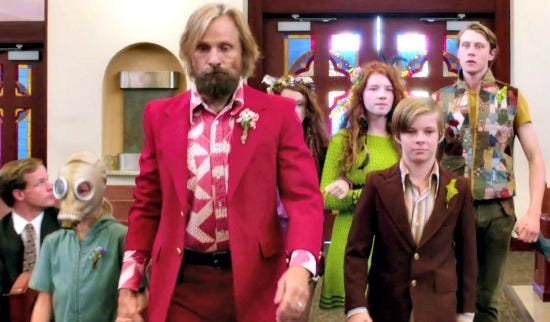Captain Fantastic

“Captain Fantastic” is about a rebel who learns the limits of rebellion. Viggo Mortensen plays Ben Cash, who long ago gave up on Western civilization and is raising his six kids in the woods like primitive American Indians.
They grow or hunt their own food; the opening scene is of his eldest son tackling a deer and slitting its throat, thereby marking his ascension into manhood. They keep some books and musical instruments to feed their minds and souls, and have an old tour bus for rare trips into town for mail, phone calls and to barter their handmade goods.
Otherwise, they’re doing the Thoreau thing to such an extreme even Bernie Sanders might find their liberalism in need of watering down. They celebrate Noam Chomsky’s birthday instead of Christmas, for God’s sake.
Then Ben’s wife, who has been hospitalized for some time with mental illness, dies, and he and the children undertake an adventure to attend the funeral in New Mexico and see that her last wishes are honored — namely, cremation and flushing down the nearest toilet. Mom (Trin Miller, glimpsed only in flashbacks and visions) may have been schizophrenic and depressed, but she did not lack a sense of humor.
This means confronting modern American society, which to the kids is as alien as Jupiter, with its heffalump-sized people, violent video games and obsession with material stuff. Representing the epitome of The Man is Ben’s father-in-law (Frank Langella), a rich and connected fellow who has forbidden the motley clan from attending the burial ceremony.
The two men, representing arch extremes of the American Dream, are set up for an inevitable showdown.
If this were all there was to the movie, then I doubt I would’ve admired “Captain Fantastic” as much as I did. Sure, Mortensen has a sly, dry charisma to his performance, the kids are distinctive and authentic, and there’s plenty of comedic material in their encounters with everyday awfulness.
“What’s cola?” one munchkin asks during an impromptu (and abortive) visit to a diner. “Poison water,” Ben deadpans.
But writer/director Matt Ross — who won the director award at the Cannes Film Festival — takes the next, more ambitious steps. Without giving too much away, the movie shows the supremely confident Ben confronted with his own ego. He’s forced to recognize that the super-kids he’s raising are still just children, and have needs beyond the intense home-schooling and survival skills he imparts with a stern hand.
The relationship between Ben and his children is at the heart of the movie. Each child actor shines, creating a distinct personality that stands out while assimilating into the group’s commune existence.
George MacKay plays Bodevan, the eldest. (All the children have unique names, so they’re the only one of them in the world.) Though he’s smart enough to get into every Ivy League school — applications made without his father’s knowledge — Bo finds he knows little of the real world, especially young women.
Kielyr and Vespyr (Samantha Isler and Annalise Basso) are the red-haired voices of reason and contemplation. Rellian (Nicholas Hamilton) is the tween and resident rebel, and the most eager to leave the cloistered home. Zaja (Shree Crooks) is 8 years old but can already give an insightful overview of the Citizens United Supreme Court case. Nai (Charlie Shotwell) is the youngest and most mercurial, having to be reminded to wear clothes at meals.
(Though Dad also needs such reminders, as we see in a brief encounter with Mortensen breaking his fast.)
“Captain Fantastic” is a very entertaining film, but I was impressed by its willingness to question its own premise. Here is a family with its own very radical interpretation of independence, finding that true wisdom isn’t relegated to a single place or creed.



